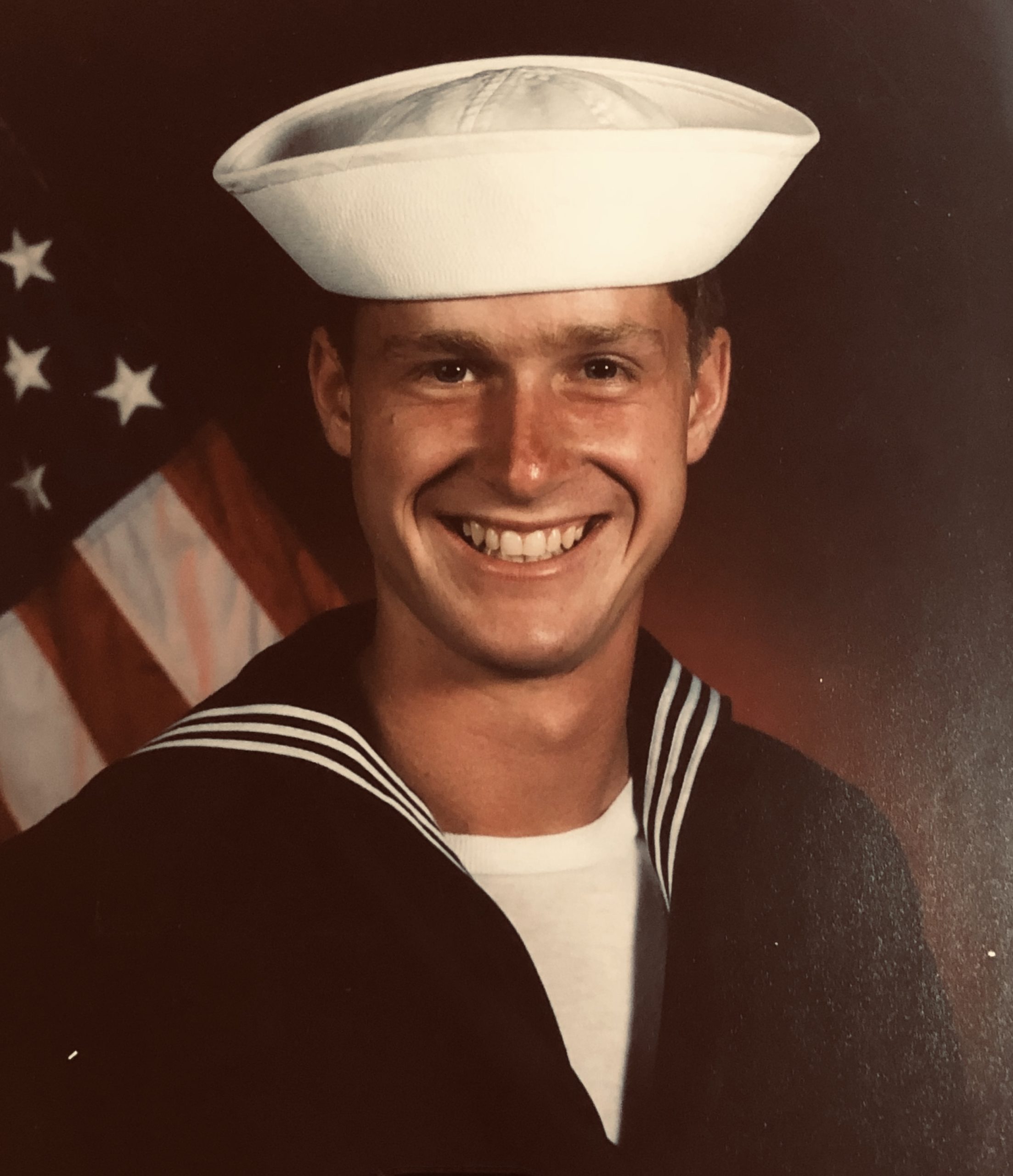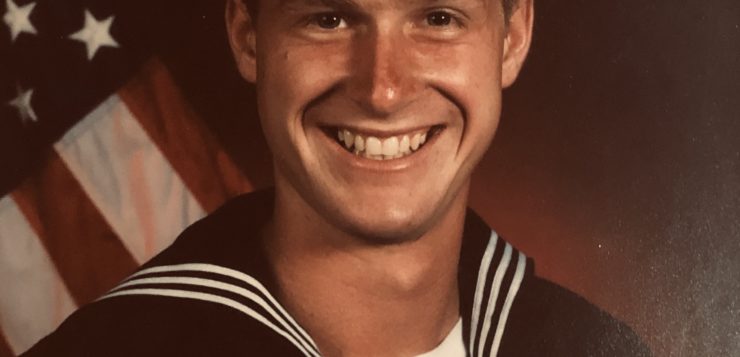“I’ve got some bad news,” the lieutenant commander began, pointing to a seat across from her desk. I sat down, trying not to look nervous despite the deepening pit in my stomach. It was the early morning of Tuesday, May 26, 1992. I was 21 years old.
I knew exactly what the commander would say, why she had summoned me to her windowless office as I was coming off back-to-back overnight shifts. This was the moment I had been dreading for two months after agents from the Naval Investigative Service questioned me about John, a Marine I had a crush on whom I thought was gay. Unfortunately, this foreknowledge did nothing to stem the tide of panic and dread swelling inside me.
“NIS has concluded its investigation and determined that there are grounds to suspect you are a homosexual. You are being recommended for separation from military service,” she said, pausing for a few seconds for a response that never came. “I recommended getting good legal counsel and taking these next few days to think about what you will do. Do you have any questions?”
“No, ma’am.”
“Very well. Your security clearance is revoked until the matter is closed. You will be reassigned to Facilities in 30-F. I’ll need to take your badge. You’ll get a new one when you come back later this week.”
I stood up, handed her the badge and opened the door. I walked briskly toward the exit, past the sentry desk where I used to stand watch, and stepped out into the morning sun.
As I continued toward the front gate, I gazed up at the towering antennas that formed the “Bullring” of the Navy listening post where I was stationed in Rota, Spain. My head was spinning so fast that I don’t remember much about the next few days, except for biking to my off-base housing as fast I could, as if trying to outrun my truth one last time.
I knew immediately that a new life was dawning, one of wrenching decisions, military proceedings and searching for the words to tell my family: Not only am I gay but I am being kicked out of the Navy for it.
What I hadn’t counted on was feeling completely abandoned. When I returned to the Bullring a few days later, an admin handed me a red badge to replace the green one the commander took away. I no longer had access to the secure watch floor where I worked for the last year as an enlisted cryptologist. Instead, I reported to 30-F where I mopped floors, painted decks and fixed things for the next four months. I was even required to have an escort accompany to me to the restroom.
Just like Hester Prynne, my new badge signaled a major transgression for all to pass their judgment—only instead of Hester’s scarlet “A” for adultery, my red badge telegraphed “G” for gay.
“What happened to Petty Officer Hendrick?”
“Why did they take away his security clearance?”
“Why is he in 30-F?”
“Holy shit.”
In a matter of hours, shipmates who were normally friendly ducked into side rooms to avoid me in the passageways. My old supervisors would only nod from a safe distance. In the cafeteria, not a soul would make eye contact. So much for the intelligence community keeping secrets: Everyone knew.
The toughest part was being left to fight alone by other gay servicemembers, most of whom now avoided me like the plague. In retrospect, it was impossible to blame them, for they were now at tremendous risk of guilt by association. All of my actions, all of my relationships, came under a microscope in the weeks leading up to my administrative trial. I later reviewed my official case file and read depositions of friends and co-workers who were questioned about my personal relationships. The authorities were hoping to ensnare others in their witch hunt.
In a matter of days, I became a complete pariah. I was desperate to find a way out, but couldn’t tell my family. I wrote to my Senator back home, Carl Levin, but he didn’t respond. Not only was I facing military prosecution, not only did I have no money to hire a private attorney or know how to find organizations to help, not only did I have to confront my shame about being gay and now getting booted out of the military; I was crushingly alone.
Except for one friend.
It’s hard to overstate the risk Randy took later that week when he walked over to the maintenance shed where I spent most work days trying to avoid the world. In plain view of the Facilities staff and everyone passing by—and at a time when every aspect of my life was under scrutiny—he came over to say hello. “Hey Dano. Whatcha doin’?”
Randy and I had known each other for a couple of years, having overlapped foreign language training in California. We had a lot in common: both good at learning languages, both from Michigan, and both trying to navigate gay life in the deeply homophobic military of the 1990s.
We were members of a small group who used to leave base on the weekends to visit gay bars in Seville, located a safe two-hour drive away. Unlike most of the others, however, Randy wasn’t afraid to be seen with me—on base or at work, defiantly. We began to hang out more and more, whether for dinner or visiting nearby towns. We started lifting weights a couple of times a week at the base gym—sometimes just steps away from the very Marine who turned me in. “That’s him? I mean, he’s okay,” Randy said, when I pointed out John. Then, turning his head over to another guy in a tight shirt and shorts on the bench press: “Now that one over there, he’s really hot.”
Randy saw me in a way that I needed to be seen because he had been there himself. Randy had been investigated—I suspect more than once—because he was more comfortable in his own skin, more out than I was at the time. “You know what, if they ask me again, I’ll just tell them and get out. I’ve had enough of this bullshit.”
Randy’s acts of solidarity and courage decades ago almost certainly saved my life. They also laid the foundation for a friendship that is still my closest. In the intervening decades, after getting thrown out of the Navy, we became very close, more like brothers than friends.
There’s a saying that “An old friend is worth two new ones.” When it comes to longtime queer friends, the ones who have lived the same struggles and walked through the fire with you, their true value is priceless.

Dan Hendrick is a documentary filmmaker (“Saving Jamaica Bay,” narrated by Susan Sarandon), author (“Jamaica Bay”) and environmentalist, whose writing has appeared in the New York Times, Newsday and elsewhere. He lives in Queens, NY, with his husband, New York City Council Member Jimmy Van Bramer.







Discussion6 Comments
A true story of true lives. Luckily we both turned out alright, despite anything and everything.
People like you are an inspiration to us all, Randy.
Thank you for sharing your story Dan. Even now far removed from that time and place the pain and isolation come through. What a loss for the US Navy, what a gain for the world and those of us lucky enough to call you a friend.
Powerful. Talk about a terrible thing to do to a young man trying to serve his country. Thank you for sharing. These are the important stories that we need to hear.
Thanks for sharing Dan. you are an inspiration
Thank you for sharing this Dan. This happened to you and shouldn’t have! A similar situation happened to me back in 1963 when I was “selected out” of the Peace Corps as a result of once being naievely honest by stating that I had homosexual tendencies. I learned as a result of my rejection that LGBTQ people had to lie for self preservation, not because of some inherent pathological dysfunction. I’m sure your experience helped to eventually make you a stronger person just as mine eventually did for me. My best to you and your husband.